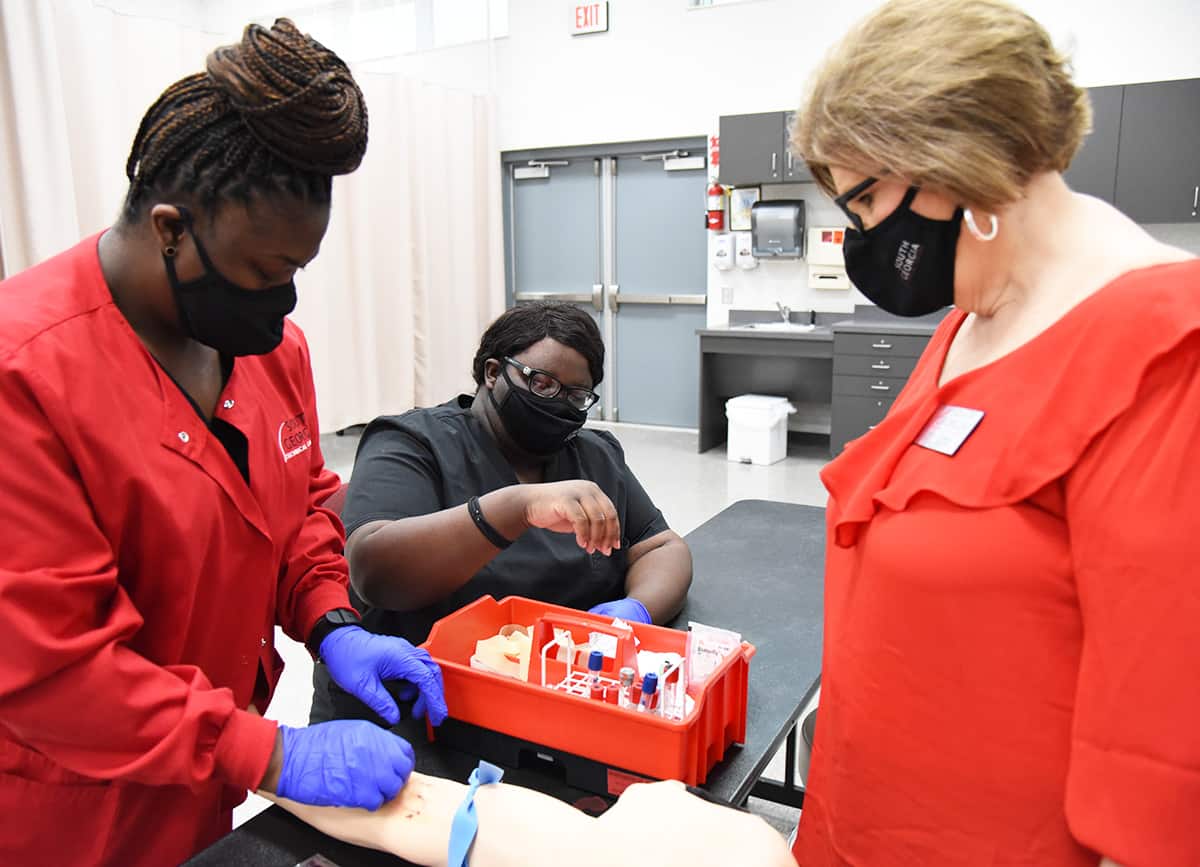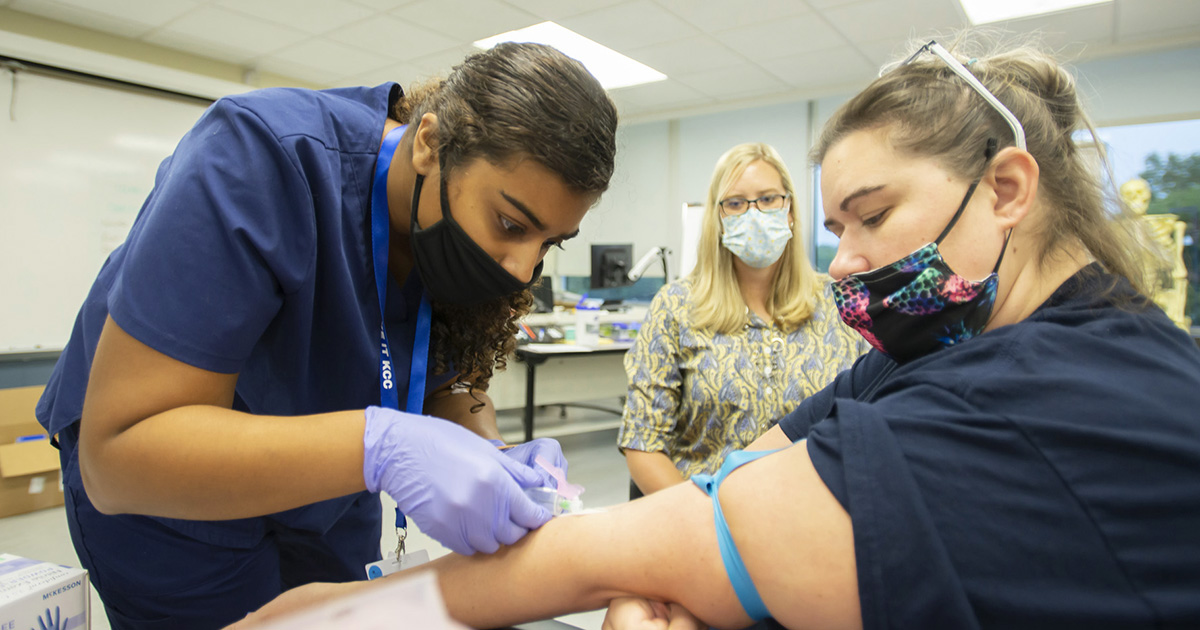Day in the Life as a Student in a Phlebotomy Training Course
Day in the Life as a Student in a Phlebotomy Training Course
Blog Article
The Path to Accreditation: Recognizing the Phlebotomy Educating Course Trip and Its Significance
As you take into consideration the course to certification in phlebotomy, it's important to comprehend the duty you'll play in healthcare. Your training will certainly cover important abilities, from blood collection methods to patient communication.

The Duty of Phlebotomists in Health Care
Phlebotomists play a crucial role in the healthcare system, working as the important link in between individuals and crucial diagnostic screening. You'll carry out blood attracts, guaranteeing samples are gathered properly and securely. Your proficiency helps in identifying medical conditions, keeping an eye on health, and guiding treatment choices.
In your day-to-day communications, you'll need to establish count on with people, making them really feel comfortable throughout what may be a difficult experience. You are in charge of labeling and managing samples carefully to stop contamination or errors, which could impact test outcomes.
Past this, you'll typically work together with doctors and registered nurses, communicating important info about people' problems. By grasping your skills, you contribute meaningfully to individual care, making you an essential part of the medical team.
Summary of Phlebotomy Training Programs
When checking out phlebotomy training programs, you'll find different types made to fit various schedules and finding out styles. Each program assists you establish vital abilities like blood collection and client communication. Comprehending these alternatives is vital to choosing the appropriate path for your occupation.
Types of Educating Programs
Numerous kinds of training programs are offered for those looking to come to be skillful in phlebotomy. You can pick from certificate programs, which typically last a few months and concentrate on vital skills. There are also diploma programs that give a more comprehensive education, often lasting up to a year. If you're seeking a much deeper understanding, an associate level in a relevant field could be the best fit. On-line programs offer adaptability for those stabilizing job or family members dedications, enabling you to examine at your very own speed. In addition, some healthcare facilities and centers supply on-the-job training programs, providing useful experience while you learn. Whatever path you choose, each program intends to outfit you with the required skills for a successful phlebotomy job.

Secret Abilities Created
Understanding phlebotomy calls for a collection of key skills that are established with comprehensive training programs. In addition, interaction abilities are basic; you'll require to engage with individuals, discuss procedures, and placed them at convenience. Each of these abilities is vital for your success as a licensed phlebotomist, making you an important property in any kind of health care setup.
Trick Elements of a Phlebotomy Course
In a phlebotomy training course, you'll concentrate on necessary topics that prepared for your future profession. You'll participate in hands-on training that allows you to apply what you have actually found out in real-world setups. Both the core educational program and sensible experience are important for your success as a phlebotomist.
Curriculum Review
While pursuing a phlebotomy training program, you'll experience a curriculum made to outfit you with essential skills and expertise. Phlebotomy Courses Near Me. This educational program typically consists of makeup and physiology, focusing on the circulatory system and recognizing blood components. You'll additionally find out about different kinds of blood collection methods, consisting of venipuncture and capillary leak strategies
Furthermore, infection control and security procedures are necessary elements, ensuring you understand just how to preserve a clean and sterile setting. You'll study patient communication, highlighting interaction and empathy, which are essential for alleviating person anxiety. Moral and legal factors to consider will certainly be dealt with, preparing you for real-world duties. This fundamental understanding will enable you to stand out as a phlebotomist and give quality care in scientific setups.
Hands-On Training Experience
Getting hands-on experience is a vital component of your phlebotomy training program. This useful training permits you to apply what you have actually discovered in a real-world setup, improving your abilities and self-confidence. You'll exercise venipuncture strategies, learn exactly how to manage various kinds of samplings, and get familiar with the equipment used in Phlebotomy school the field. Under the support of knowledgeable trainers, you'll improve your abilities, ensuring you're prepared for any situation you might face.
Additionally, you'll obtain the opportunity to interact with people, which is important for creating your interaction skills. This combination of technological proficiency and interpersonal skills is essential for your success as a licensed phlebotomist. Inevitably, hands-on training is where theory fulfills practice, strengthening your knowledge and readiness for accreditation.
Qualification and Licensing Needs
Before you can begin your occupation in phlebotomy, it is essential to understand the certification and licensing requirements that differ by state. The majority of states require phlebotomists to hold a certification from an acknowledged organization, such as the National Phlebotomy Association or the American Culture for Scientific Pathology. These qualifications typically include passing a test that checks your expertise and abilities in the field.
In addition to certification, some states have details licensing needs. You might require to complete a specific variety of hours in scientific method, submit evidence of training, or undergo a background check. It is essential to investigate your state's policies to make certain you satisfy all necessary requirements.
Staying informed regarding these requirements not only helps you protect a placement yet also enhances your reliability as a specialist. By satisfying these demands, you'll be well on your way to a successful profession in phlebotomy.
Hands-On Training and Practical Experience
Hands-on training and useful experience are necessary components of your phlebotomy education, as they enable you to use academic expertise in real-world scenarios. Throughout your training, you'll participate in monitored venipuncture, discover appropriate techniques, and become knowledgeable about numerous blood collection tools. This straight participation is critical for developing your self-confidence and sharpening your skills.
You'll work closely with experienced experts that can guide you via the nuances of person communication and example handling. Each session not only strengthens your understanding yet additionally prepares you for the hectic setting of healthcare settings.
Furthermore, many programs integrate professional turnings, permitting you to experience varied settings, from medical facilities to outpatient facilities. This exposure aids you adjust to different difficulties and patient demands, ensuring you're well-prepared for your future duty. Welcome these opportunities, as they're necessary to ending up being a competent and thoughtful phlebotomist.
Challenges Encountered Throughout Training
While getting hands-on experience is necessary, it's essential to acknowledge the challenges that can emerge during your phlebotomy training. Additionally, mastering the skills needed for blood draws takes practice; you may have a hard time with technique initially.
Time monitoring can likewise be a difficulty, as harmonizing concept, functional sessions, and individual dedications can feel intimidating. You might encounter differing learning rates among your peers, causing sensations of insecurity if you think you're dropping behind. Adapting to the different personalities of trainers can be challenging, as each may have an unique teaching design.
Acknowledging these barriers early on can prepare you for success and assist you develop strength throughout your training journey.
Occupation Opportunities After Certification

As you obtain experience, you may also consider specializing in areas like pediatric or geriatric phlebotomy, catering to details individual requirements. Some phlebotomists choose to advance their jobs by ending up being research laboratory specialists or going after additional education and learning in medical care areas.
Furthermore, your qualification can bring about duties in training or overseeing new phlebotomists, enabling you to share your knowledge. With the health care sector continuously growing, your skills will constantly remain in demand, leading the way for a steady and satisfying job. Welcome the chances waiting for you!
Frequently Asked Questions
What Is the Typical Period of a Phlebotomy Training Program?
Phlebotomy training programs normally last around four to 8 weeks. You'll take part in hands-on technique, class instruction, and on the internet knowing. Finishing this training prepares you for qualification and a satisfying career in medical care.
Are Online Phlebotomy Courses Available?
Yes, online phlebotomy courses are readily available. They use flexibility and benefit, allowing you to examine at your own pace. Just validate the program is approved to meet qualification requirements and acquire important abilities for your occupation.
Just How Much Does Phlebotomy Training Usually Cost?
Phlebotomy training typically sets you back in between $700 and $2,500, relying on the program and area. You need to consider factors like program length, consisted of materials, and hands-on experience when picking the right training for you.
What Are Common Requirements for Phlebotomy Training?
Typical prerequisites for phlebotomy training commonly include a high college diploma or GED, immunizations, and a background check. Some programs might also call for fundamental medical care expertise or accreditations, ensuring you're gotten ready for hands-on training.
Can I Work While Finishing My Phlebotomy Training?
Yes, you can work while completing your phlebotomy training. Numerous pupils equilibrium work with their research studies, yet ensure to manage your time properly to guarantee you satisfy both job and training commitments successfully.
Report this page